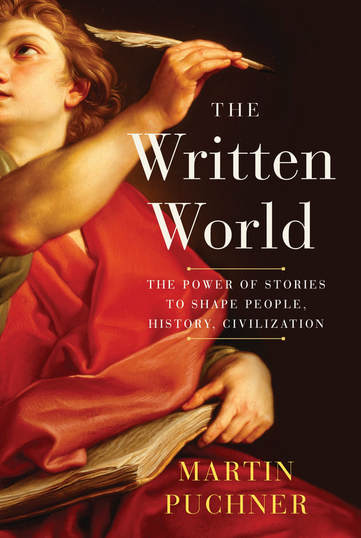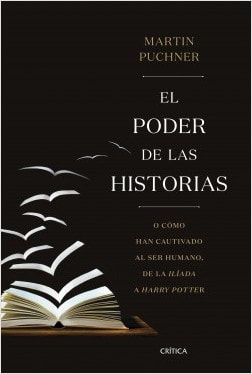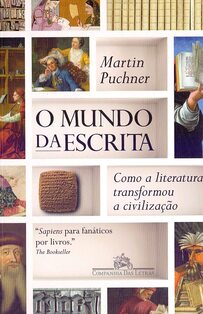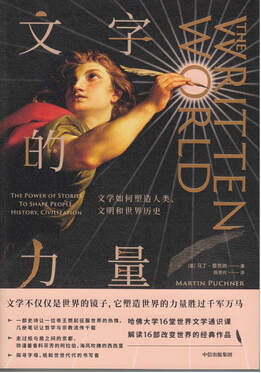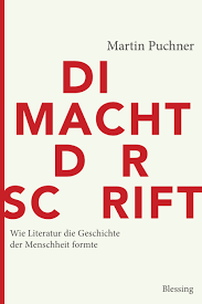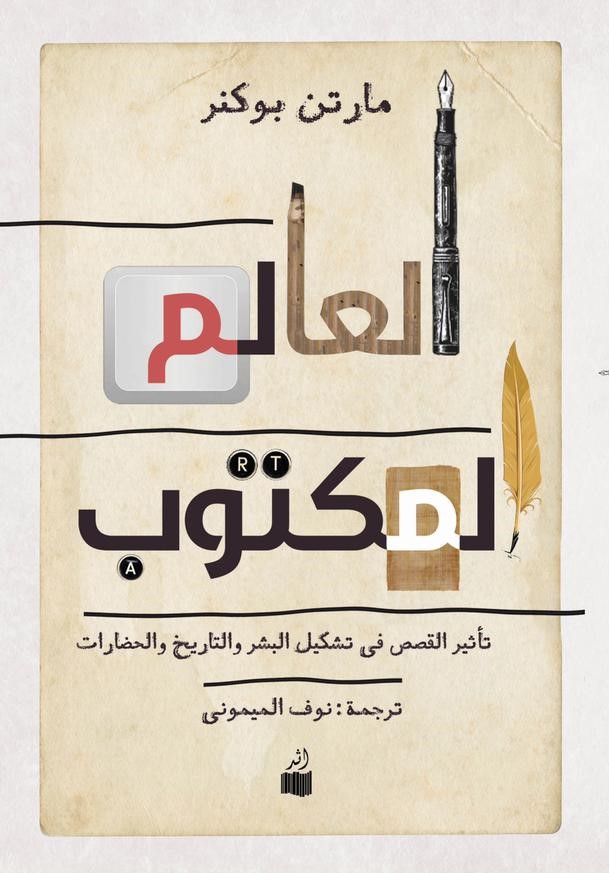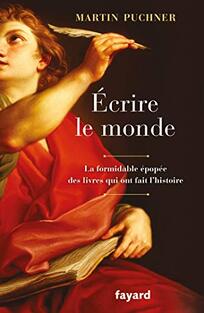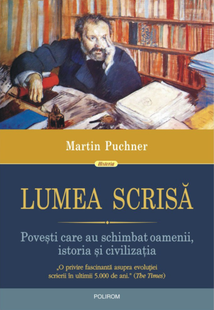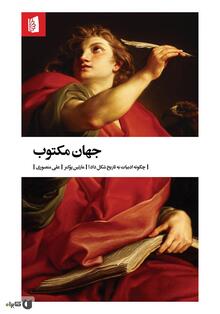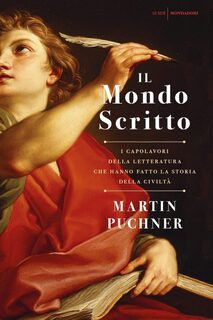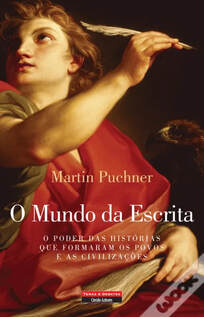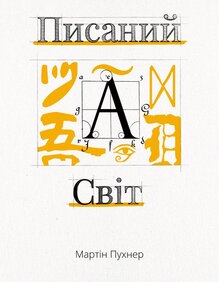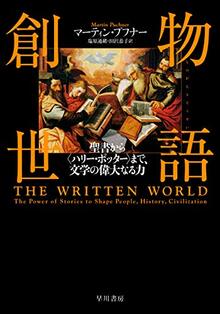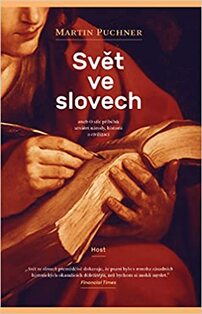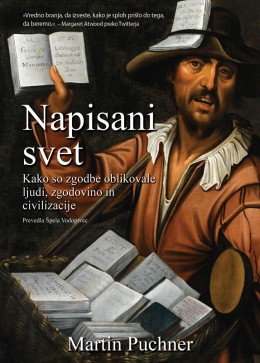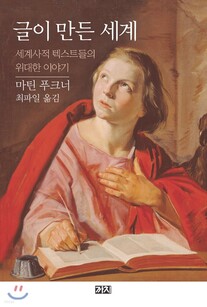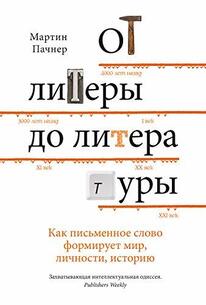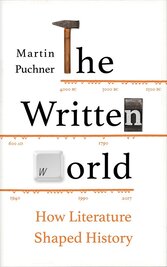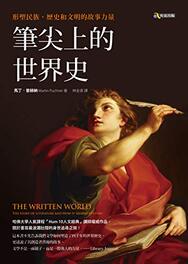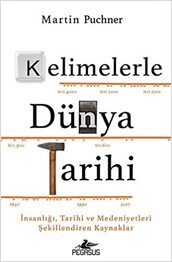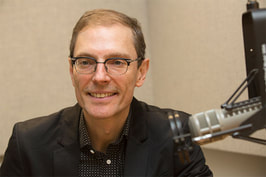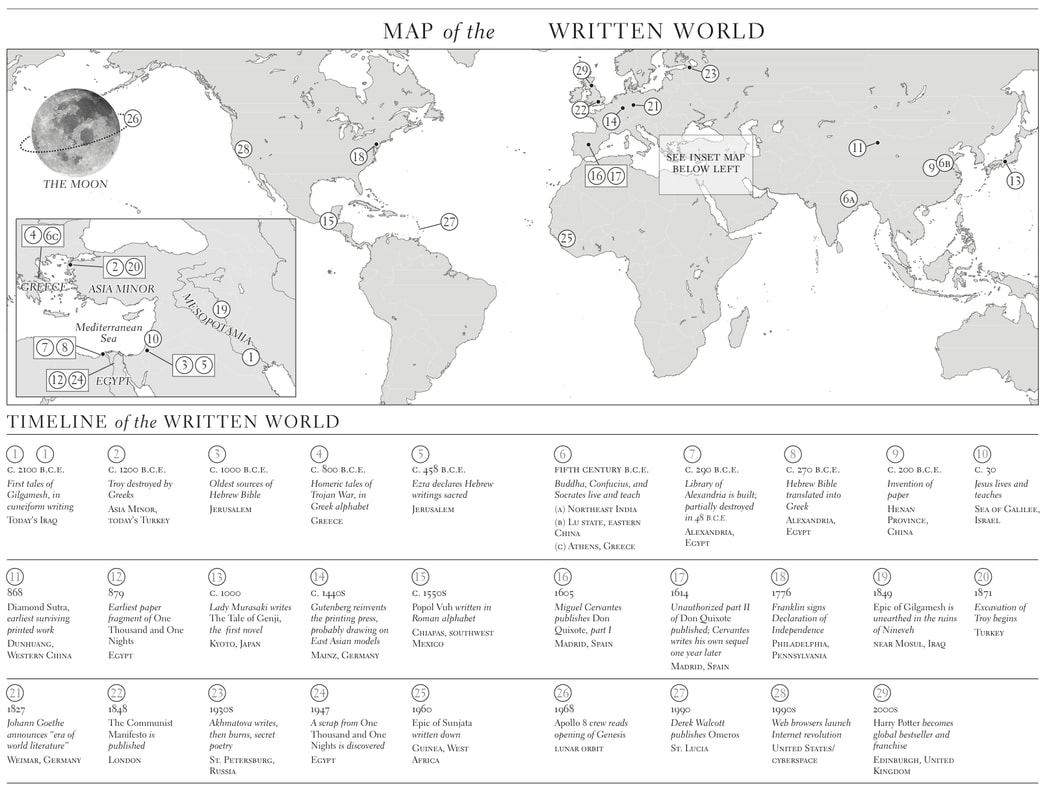|
From clay tablets to the printing press.
|
From the pencil to the internet.
|
From the Epic of Gilgamesh to Harry Potter.
|
This is the true story of literature and how it shaped people, history, civilization.
|
"[An] enthralling account of how writing developed… [Told with] lively engagement […] Puchner’s boundless curiosity propels him not just through the world of books but around the globe… The breathtaking scope and infectious enthusiasm of this book are a tribute to the ideal of [Goethe’s “world literature”]" John Carey, Sunday Times "It's with exhilaration, then, that one hails Martin Puchner's book, which asserts not merely the importance of literature but its all-importance. . . . Puchner explains it all with brio. . . There is a joyous personality in this book. . . . Fieldwork for "The Written World" takes him to every continent, digging inexhaustibly into cultures for their foundational and sacred stories. Martin Puchner's score on RateMyProfessors.com must be sky high. I suspect he is as enlightening at the lectern as on the page." John Sutherland, New York Times Book Review "The Written World takes in everything from the clay tablets in ancient cities such as Nineveh to the role played by newspapers in the American Declaration of Independence. . . Across this landscape, it builds a convincing case that writing technologies are more foundational in major historical moments than we may have otherwise thought." Thomas Hale, Financial Times "Puchner, an English professor at Harvard, makes the case for literature’s pervasive importance as a force that has shaped the societies we have built and our very sensibilities as human beings. His fieldwork takes him to every continent, digging inexhaustibly into cultures for their foundational and sacred stories." New York Times, Editor's Choice, January 14, 2018 "“IN THE beginning was the Word…” That stirring opening of the Gospel of St John could easily serve as the thesis of Martin Puchner’s “The Written World”, an episodic history of human civilisation as shaped by and told through its literature. Mr. Puchner is a clear-eyed and helpful guide. . . bringing scribes and scribblers out form the shadows and giving them their moment in the sun. His approach is often instructive, allowing the reader to see familiar events through a different lens. Almost all the author's discussions are illuminating." Economist "Our brains appear to be hard-wired to respond to stories, and reading appears to be a uniquely powerful way to experience narrative. Martin Puchner’s recently released “The Power of Stories to Shape People, History, Civilization” makes a case that stories are the building blocks of civilization itself, that literature has “shaped the lives of most humans on planet Earth.” John Warner, Chicago Tribune "Puchner's book is fascinating . . .[it] excels at showing the global nature of the written word," Stuart Kelly, The Scotsman "As a professor of English and comparative literature at Harvard, Martin Puchner has built a life and career around books and stories. But there are some tales whose influence exceeds the norm." Kate Tuttle, The Boston Globe "Martin Puchner's vivid new history of writing . . . eschews a straight survey in favour of a series of vignettes which capture what is gained and what lost from writing things down. . . . Puchner is brilliant on the role paper has played in shaping literature. . . Never short of engaging, Puchner leaves you full of admiration." Daisy Dunn, Times Literary Supplement "From Iraq to South America, Martin Puchner's tour through the places and texts that have shaped humanity is wonderfully rich," PD Smith, The Guardian "The Written World is an informative, relentlessly entertaining account of the development of literature" Malcolm Forbes, The National "Puchner traces the history of literature in the rise and fall of empires and nations." Recommended in column, The Power of Books to Propel Your Career in 2018. Carmine Gallo, Forbes "A hugely engaging exploration of how writing changed civilizations, cultures, and the history of the world. . . . The Written World tells the riveting story of the development of literature . . . Through vivid storytelling and across a huge sweep of time, The Written World offers a new and enticing perspective on human history." DC News, Editor's Picks "For those whose refuge is the word--on screen, on paper, or chiseled in ancient stone--and for those who appreciate a tale well told, The Written World is a book you will want to read from cover to cover." Brian Tanguay, Santa Barbara Independent "The Written World [is] a fascinating and lively account of how literature has shaped history from earliest times. . . It's the combination of the well-known and the obscure that intrigues. Puchner, a professor of English at Harvard University, traces the journey of foundational texts, such as the Iliad or The Tale of Gilgamesh or the teachings of Jesus or Buddha, and there is much here I didn't know." Jane Sullivan, The Sidney Morning Herald "This look at how writing has developed over 5,000 years is breathtaking in its scope." Included in must reads by The Times Ten best non-fiction books of 2017: "[Puchner] shares the stories behind the stories and the change they created with verve and affection." Zocalo Public Square "[A] rousing narrative . . .such is the breadth of erudition and fascinating tidbits he features that literary aficionados will treat this as a vindication of their stand . . .an eye-opener." Vikas Datta, Business Standard No. 7 bestseller in Literary Criticism (Library Journal) "Excellent prose, [the author] explains his points masterfully . . . very readable and interesting. I recommend it to anyone who reads." Ralph Peterson, Tulsa Book Review One of Best Books about Books for Book Lovers 2017. Alexander Atkins "Every page is worth reading . . . The Written World has revived my interest in literature." Elfen S. Cruz, The Philippine Star. S The Written World--the book on President Clinton's night stand . . . "Harvard professor Puchner has turned out a ver clear and accessible volume, which sweeps from early scratchings on clay tablets in Mesopotamia to the social media and self-publishing of today . . . a gripping story." Sunday Herald |
A gripping intellectual odyssey." Publishers Weekly
"A lucid entertainment." Kirkus Review "An exhilarating feat of intellectual athleticism." Louis Menand "Well worth a read, to find out how come we read." Margaret Atwood, via Twitter "A unique and spellbinding book." Elaine Scarry "Restless, witty and learned, and endowed with seemingly infinite curiosity, [Puchner] brings home to us how much we have been formed over the millennia by the tales we have invented and recorded." Stephen Greenblatt "Informative and engaging, Puchner's work provides a substantive but accessible account of the culture of writing and the transmission of literature. Of value to both general readers and specialists." Library Journal "Two-time Norton anthology editor [Puchner] makes a breathtaking leap from Homer to Derek Walcott, illustrating why it is impossible to imagine a world without literature." Harvard Magazine "Wide-ranging and effortlessly erudite . . . and ending with a playfully provocative look at the global phenomenon of Harry Potter." The Irish Mail on Sunday "An invigorating global survey of literature's deep impact on the course of history." Harvey Freedenberg, Shelf Awareness "It's literature not as mirror, then, but as potent force. What could be more important?" Library Journal, Barbara's Non-Fiction Picks. Book Recommendation by Time's 100 most influential people of 2017 Staff recommendations, San Francisco Chronicle, 21 Jan 2018 November reading list by Adventures of the Bibliophile "In this amazing book, Puchner traces 4,000 of world history through the written word. For book and literature lovers, The Written World is a new way to examine and understand world history." Eight Cousins, Holiday Picks 2017 "[Martin Puchner] gives us the story of literature, of how great texts and technologies have shaped cultures and civilizations and altered human history." Recommendations, The Hindu "[Puchner's] interests in the past and future of writing are vividly presented in his wide-ranging and breezy The Written World. [He] has enthusiastically given us the beginning and middle of literature's ongoing story." Laurie Greer, Politics and Prose "Martin Puchner’s breathtakingly erudite and elegant The Written World . . . covers anything and everything you ever wanted to know about anything and everything" Michael Eskin, A Publisher's Reflections on the Frankfurt Book Fair 2017 "Sapiens for bookworms" Bookseller "The Written World is so chock-a-block with fascinating history, it will keep the curious reader riveted till the final pages." Book Jones Review "Spellbinding and expansive, The Written World will be enjoyed by academic scholars and literature buffs." Book Riot "Literature is to be celebrated! What would our world be like if skilled scribes had not had the passion to write down the words of oral storytellers by using the writing tools of their day." Jean M. Girffing on The Written World in Redlands Daily Facts "Taking in its sweep the invention of paper, the alphabet, movable type, etc., the book examines certain foundational texts. But this is more than a textual analysis — and as he travels across continents, Puchner manages to give his inquiry feisty shape. . . The most riveting portion on the power of storytelling is on Derek Walcott, the West Indian poet who won the Nobel Prize in 1992 and passed away a year ago. " Mini Kapoor, The Hindu "What is better than a book? A book about Books! A ]groundbreaking] book that history buffs, techno-geeks, and book lovers alike will savor." Peabody Library "What better way to start your 2018 book reading than this exploration of how stories & literature have shaped humankind." Our book of the day, Literate Lizard "There's some serious staff love for this book and it's no wonder as to why. Through sixteen landmark works, Puchner explores the importance of the written word and all it has influenced through history. A true book lover's treasure." Top Gift Books of 2017 "A fascinating celebration of literature . . . perfect reading for a long, chilly night, and it will leave you thinking in new ways about the wondrous thing called literature that, perhaps, we sometimes take for granted." Robert Weibezahl, Book Page Book of note, Formwork Review, January 1, 2018 "One of this year's best books." Jim Kelly, The Loafer Online Top-six Christmas wish list for book lovers, along with Plath and Proust . . . Book Lounge "You might think of the printing press in the production of writing as a speedy and efficient prototype that led to rosier times. In fact, this first step in getting ideas words on paper and distributed quickly to a waiting public had a huge downside. “It could be harnessed against writers,” Puchner tells us." Michael Langdon, ABC-7 "Martin Puchner has penned the fascinating story of how literature shaped world history." Independent New England Book Sellers Association "Puchner has written a fascinating cultural history of the written word." Dr. Burkhard Luber, Milieu "[An] extraordinary book . . . . gracefully narrated." Carmen Hernández, El Nuevo Día "The scholar Martin Puchner, among the leading names of the new American Criticism . . . traces the evolution of writing and literature brilliantly." Gian Maria Annovi, Il Manifesto Alexander kept his dagger because he wanted to escape his father's fate, who was assassinated. The box he had seized from Darius, his Persian opponent and the Iliad he had brought to Asia because, as Puchner puts it in his book The Written World, 'it was the story through which he saw his campaign and life, a foundational text that captured the mind of a prince who would go on to conquer the world.' Alexander considered this as sacred text, so he carried it with him on his campaign. Puchner also suggests that Alexander, as a reader, 'put himself into the story, viewing his own life and trajectory in the light of Homer's Achilles.' Kanan Pukayastha, Daily Observer Puchner tells the story of literature as a mobile, constantly mutating, entity. His telling grip[s] the reader . . .vividly dramatized. . . at the end, the image that abides is that of Ann Akhmatova who wrote, memorized and burnt her poems, and entrusted her female friends with the same responsibility." Telegraph India. "brilliant and ambitious . . . painstakingly researched . . . Puchner's chapters . . . are fascinating for their transportive quality. . . . A great reading experience. Aqsa ljaz, Dawn. Interview with Deborah Kalb |
International editions:
